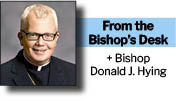
I have recently been trying to declutter my life. My office, car, and apartment are filled with a motley collection of papers, knick-knacks, delayed correspondence, unneeded clothing, and varied things that have just piled up over the course of time.
If every piece of clutter represents a postponed decision about its ultimate destination, I have many decisions to make!
I barely watch television, but occasionally have tuned into Hoarders, the show that helps a person living in unimaginable clutter and often squalor, to find freedom, health, and a new life, both by cleaning out their house and by dealing with the emotional and psychological issues which drive them to keep on hoarding.
In watching the show, I have always been struck by how a genuine hoarder not only hangs onto the clutter but also keeps bringing more in.
This dynamic is truly a psychological and spiritual malady.
A liberating experience
Ridding ourselves of clutter is liberating because it opens up the needed space in our environment to focus without distraction, to share possessions we do not need or use with those who could benefit, and to just feel more peace and joy in the glow of a simplified and organized life.
We can translate those experiences of cleaning out our closets, attics, basements, offices, and cars into spiritual terms.
How much emotional, psychological, and spiritual clutter do we hang onto? How many sins, regrets, and wounds do we cling to? How much anger, fear, and resentment do we befriend and feed with the passage of years?
The Lord wants us to be free of all of that, so that we can move through this life unfettered and available to His grace and will, not emphasizing the wrong things, not caught up in what does not ultimately matter.
The Sacrament of Reconciliation is the remarkable gift that Christ offers us through His Church so that we can find the freedom of divine forgiveness and the peace of Heavenly compassion.
In Confession, I can lay my sins, guilt, wounds, and failings down before the Lord and experience the healing power of His mercy and forgiveness.
This astounding gift is a profound expression of the Lord’s love for us. He does not want one of His beloved children to go astray and remain lost and hopeless.
Here in the diocese, we are experiencing a renewal of the Sacrament of Reconciliation.
Our priests zealously preach and teach about it, making themselves generously available in many parishes on a daily basis to hear Confessions and absolve sins.
Many of the faithful are rediscovering the power of this sacrament, movingly attesting to its spiritual efficacy in conversations that I have had with them.
In Reconciliation, God forgives our sins, gives us the grace to overcome our failings and to grow in virtue, and leads us to a deeper holiness.
When I confess my sins to a priest, the Lord is applying the full redeeming power flowing from Jesus’ death and Resurrection directly to my heart and soul.
Christ died on the Cross and rose from the dead so that I could be in this particular Confession right now and know of His love for me. I find this truth to be an astounding proof of God’s love and concern.
Take part in the sacrament
If you do not regularly go to Confession, I challenge you to an experiment.
Go to Confession once a month for a year, find a helpful printed guide to do a sincere examination of conscience beforehand, confess your sins with simplicity and brevity, do the penance the priest asks you to perform, and seek to grow in virtue.
Concentrate during the ensuing month on your greatest temptation, weakness, or sin, seeking to overcome it by practicing the opposing virtue.
For example, if your sin is gluttony, seek to be more abstemious and sparing. If your failing is your temper, seek to be more patient and understanding.
Do this for a year. I promise, and much more importantly, God promises you that you will experience His liberating mercy and forgiveness in overflowing abundance, so much so that in a year’s time, you will be more joyful, virtuous, peaceful, prayerful, and holy.
It really is very simple, but the secret is perseverance in the pursuit of virtue, avoiding discouragement in the face of failure, and fidelity to the Sacrament of Reconciliation.
Going through the piles of papers on my desk feels like going on an archaeological dig, as I sift through the layers of minutes from meetings, letters I still need to answer, reports on various diocesan activities, and minutiae that are no longer relevant.
Examining my conscience is similar, since I ask myself how I have failed, sinned and turned away from the Lord, delving into the past month of my life from that supernatural perspective.
The good and saving news is that I can take all those spiritual piles and throw them into the fiery furnace of the Sacred Heart, and thus know the freedom of Divine Mercy!

